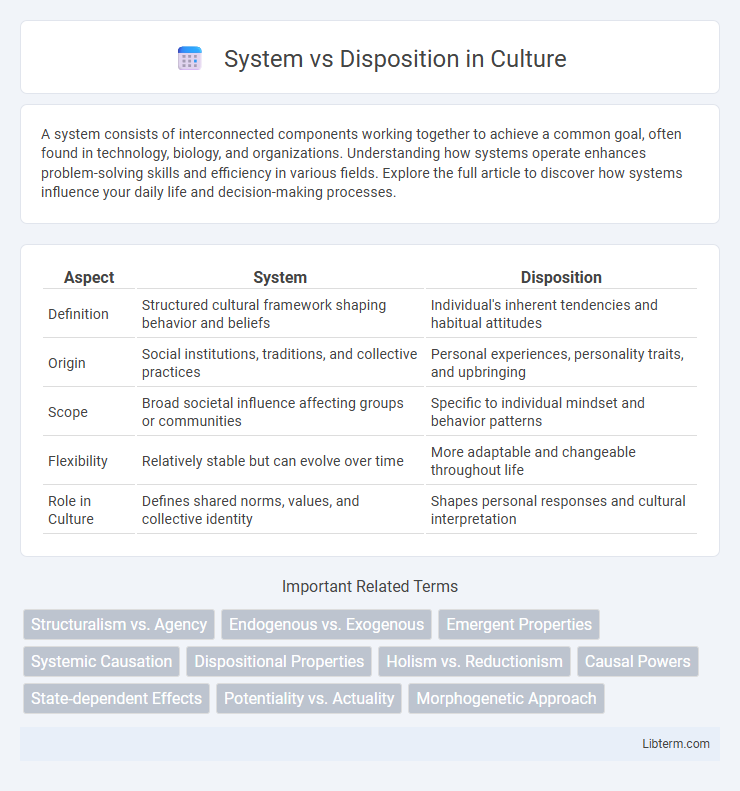A system consists of interconnected components working together to achieve a common goal, often found in technology, biology, and organizations. Understanding how systems operate enhances problem-solving skills and efficiency in various fields. Explore the full article to discover how systems influence your daily life and decision-making processes.
Table of Comparison
| Aspect | System | Disposition |
|---|---|---|
| Definition | Structured cultural framework shaping behavior and beliefs | Individual's inherent tendencies and habitual attitudes |
| Origin | Social institutions, traditions, and collective practices | Personal experiences, personality traits, and upbringing |
| Scope | Broad societal influence affecting groups or communities | Specific to individual mindset and behavior patterns |
| Flexibility | Relatively stable but can evolve over time | More adaptable and changeable throughout life |
| Role in Culture | Defines shared norms, values, and collective identity | Shapes personal responses and cultural interpretation |
Understanding the Concepts: System vs Disposition
System refers to an organized set of components or processes working together toward a common goal, often analyzed in fields like engineering, biology, and information technology. Disposition describes an individual's inherent qualities or tendencies influencing behavior, commonly studied in psychology and personality research. Understanding the distinction between system and disposition is crucial for accurately analyzing how structured mechanisms contrast with intrinsic personal attributes in various contexts.
Defining Systems: Characteristics and Examples
Systems are organized sets of interrelated components that work together to achieve a common goal, characterized by defined boundaries, inputs, processes, outputs, and feedback mechanisms. Examples include biological systems like the human circulatory system, mechanical systems such as an automobile engine, and information systems like enterprise resource planning (ERP) software. These systems demonstrate properties such as complexity, interdependence, and adaptability within their environments.
What is Disposition? Meaning and Key Attributes
Disposition refers to an individual's inherent qualities of mind and character that influence their typical behavior and emotional responses. Key attributes of disposition include consistency, stability, and predictability in reactions across various situations, distinguishing it from transient states or external systems. Understanding disposition is vital for grasping personality traits and behavioral tendencies that shape long-term patterns rather than situational actions.
Systematic Approaches in Organization and Management
Systematic approaches in organization and management emphasize structured frameworks that integrate interrelated components to achieve collective goals efficiently. These approaches prioritize consistency, repeatability, and data-driven decision-making, fostering coordinated workflows and reducing uncertainties in complex environments. Emphasizing systems thinking enables organizations to optimize resource allocation, enhance communication channels, and improve adaptability to dynamic market conditions.
The Role of Disposition in Individual Behavior
Disposition significantly influences individual behavior by shaping patterns of thought, emotion, and action that remain consistent across various situations. Unlike external systems that impose rules or structures, disposition reflects an internalized tendency guiding responses and decision-making processes. Understanding disposition enables better prediction of behavior and informs strategies for personal development and psychological interventions.
Comparing Systemic and Dispositional Perspectives
Systemic perspectives emphasize the interconnectedness and holistic nature of elements within a system, highlighting patterns and relationships that influence behavior or outcomes. Dispositional perspectives focus on inherent traits or characteristics within individual components, attributing causality primarily to internal properties. Comparing these, systemic views prioritize external interactions and context, while dispositional approaches center on internal attributes and stable tendencies.
Advantages of a System-Based Mindset
A system-based mindset offers significant advantages by promoting consistent processes that enhance efficiency and scalability in problem-solving and decision-making. This approach facilitates better resource allocation and continuous improvement through measurable feedback loops, enabling organizations to adapt quickly to changing environments. Emphasizing interconnected components over isolated events helps uncover root causes, leading to sustainable solutions and long-term success.
Dispositional Influences on Decision-Making
Dispositional influences on decision-making refer to the stable personality traits and individual characteristics that shape how people process information and make choices. Traits such as risk tolerance, impulsivity, and cognitive biases significantly affect judgment, often leading to predictable patterns in decision behavior. Understanding these dispositional factors helps improve decision-making models by accounting for inherent psychological differences among individuals.
Integrating System and Disposition for Effective Outcomes
Integrating system and disposition enhances decision-making by combining structured frameworks with individual attitudes and values, ensuring comprehensive and adaptable solutions. Effective outcomes arise when systematic processes are aligned with personal dispositions, fostering collaboration and innovation. This synergy optimizes organizational performance by balancing procedural consistency with human flexibility.
System vs Disposition: Practical Implications and Case Studies
System and disposition represent contrasting frameworks for understanding behavior, with systems emphasizing structured, predictable interactions and dispositions focusing on inherent traits and tendencies. Practical implications highlight system-based approaches improving organizational efficiency through standardized processes, while disposition-based strategies enhance individualized interventions tailored to personal characteristics. Case studies in corporate management reveal system-oriented models streamline operations, whereas psychological assessments showcase disposition-centric methods drive personalized therapy outcomes.
System Infographic

 libterm.com
libterm.com